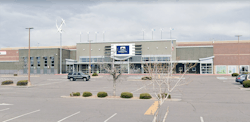Adaptive reuse projects turn unconventional spaces into schools
Adaptive reuse projects for education have turned many former big-box stores, churches, tortilla factories, and office buildings into school facilities.
The New York Times reports that school officials view the commercial real estate slump as a moment to seize on new opportunities. Growth in midsize cities, especially in the Sun Belt, offers potential for conversions. This is especially true for schools with more autonomy such as charter schools that want to try new spaces and layouts.
Charter school organizations around the nation have been adapting former commercial sites.
Colorado Early Colleges, a chain in the Fort Collins and Colorado Springs area, has all of its eight schools, and one under construction, in former commercial buildings, including a solar inverter factory and second-class office space.
For public schools, many issues make adaptive reuse less than ideal: existing real estate investments, school closings, old infrastructure and funding cuts, requirements for size and outdoor space and maintenance and material plans that discourage unusual locations. And public schools, especially high schools, are larger and have a harder time resolving issues like security, disruptive noise and windows and daylight for classrooms.
Finally, many school districts are focused on renovating and upgrading their own buildings, thanks in part to millions of dollars that have flowed to public schools via federal Covid relief funds.
Installing plumbing, heating, ventilation and air-conditioning systems that meet the needs of hundreds of students can be difficult; that’s why big box stores and other retail spaces, which often already have restrooms and kitchens, make for easier conversions.
About the Author
Mike Kennedy
Senior Editor
Mike Kennedy, senior editor, has written for AS&U on a wide range of educational issues since 1999.
